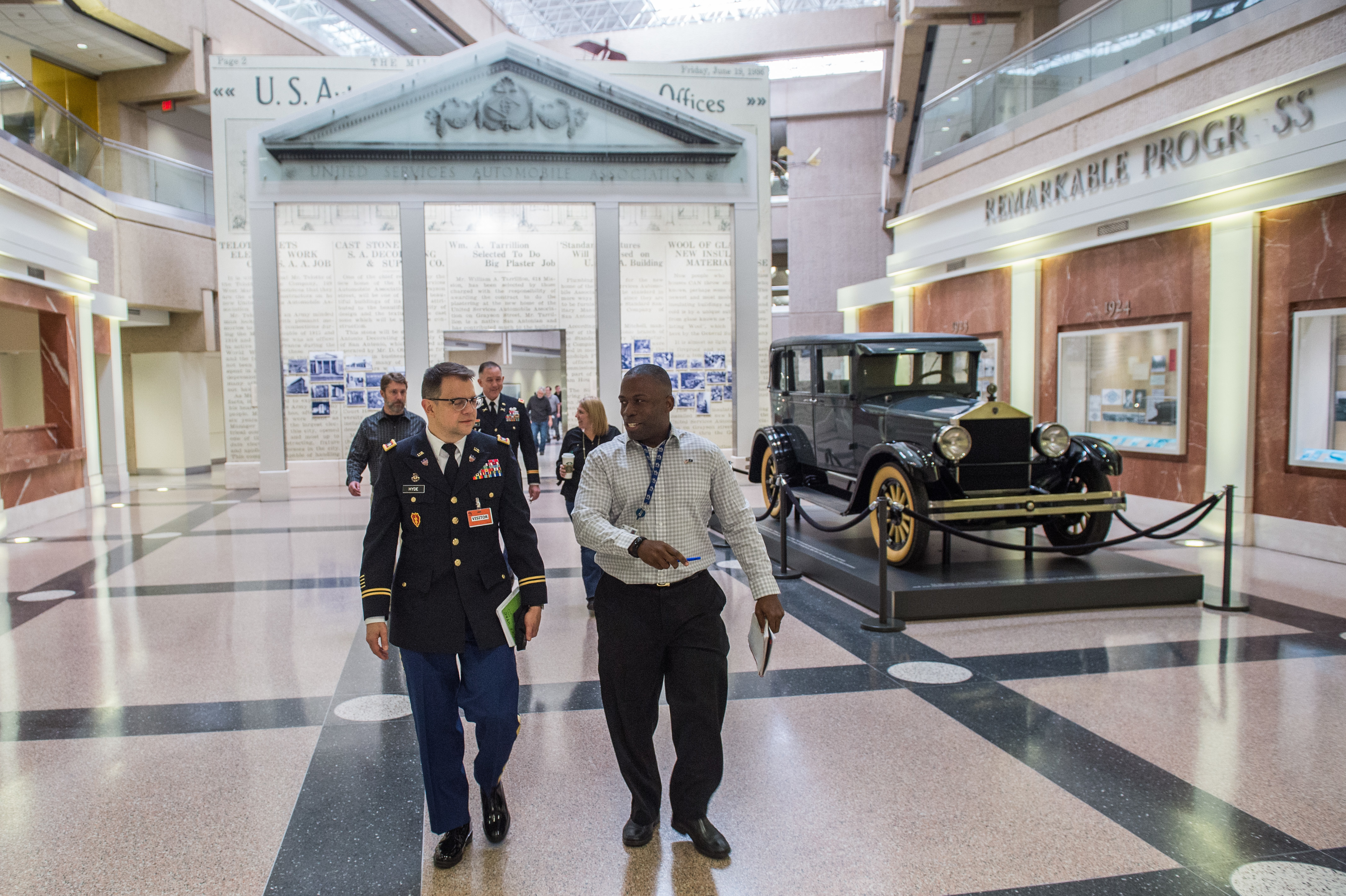
The problem with broadening assignments is the persistent tension between the requirements of the force and the desire to broaden officers
A previous Whiteboard was highly critical of Army leader development, with complaints including retaining old human resource paradigms long abandoned by civil society and sustaining up-or-out systems of promotion.
This Whiteboard explores one part of the Army’s approach to leader development: “broadening.” There are many definitions of broadening assignments, but we use the following: assignments in which Army personnel (uniformed or civilian) are a minority. An example is Training with Industry, a program that assigns officers to a defense industrial partner to learn about how the commercial sector conducts research and development, public relations, and other business activities. With the help of the Director of the U.S. Army War College Fellows Program, U.S. Army Colonel Kelly Ivanoff, this Whiteboard examines whether broadening works, presenting the views of six authors of varying ranks.
What do you think? Send your 300 word (maximum, and we mean it!) response to andrew.a.hill13.civ@mail.mil, cc: thomas.p.galvin.civ@mail.mil by October 19, 2018. Please submit with the Subject line as Whiteboard #4.
The question we asked was:
If we define a “broadening experience” as an educational opportunity or work assignment in which Army personnel are a small minority of the relevant population, are such experiences essential for developing effective senior leaders in the Army? Why, or why not?
1. Jamie Sanjuan, Major, U.S. Army, and Student, U.S. Army Command and General Staff College
Broadening opportunities are essential to the development of effective senior leaders in the Army. Critical to this assertion is the quantifiable measure of effectiveness in our Army’s senior leaders. Furthermore, if we recognize a “senior leader” as a general officer, then identifying moments of broadening time in the career paths of today’s general officer population could provide data to support this claim. Using examples of broadening in the career development of general officers can provide evidence that the Army places value in these opportunities.
The problem with broadening assignments is the persistent tension between the requirements of the force and the desire to broaden officers. As a former assignment officer at the U.S. Army Human Resources Command (HRC), there was pressure to equitably distribute talent across competing requirements of the operating force and the broad spectrum of broadening opportunities. For example, a captain just out of command might decide to take advantage of a pre-existing graduate school opportunity. This excellent educational opportunity impacts the number of captains available for assignment and limits HRC’s ability to satisfy unit-level demands. Nevertheless, allowing junior officers the opportunity to broaden outside of traditional tactical assignments frequently results in quantifiable instances of investment return.
Diversity of thought is vital when synergizing gaps of experience between tactical, operational, and strategic realms – especially in a joint environment. The Army’s broadening program may not be perfect. The realistic demands of the Army’s ever-growing mission set continues to compete with opportunities for officers to broaden their perspectives and knowledge. But the Army recognizes that broadening opportunities provide experiences and knowledge that would otherwise be difficult to achieve. Therefore, investing in broadening opportunities is essential.
2. Matt Rasmussen, Lieutenant Colonel, U.S. Army and current Battalion Commander
My answer is “no.” Army officers can be broadened through non-standard jobs inside the Army, not just exclusively through jobs “in which Army officers are a small minority of the relevant population.” My “broadening” experiences are as a small group instructor at a Captain’s Career Course, aide-de-camp for three-star general officer, a branch assignment officer at the Human Resources Command, and as commander of a security forces assistance battalion. All of these experiences have given me a wider appreciation of how the larger Army enterprise operates. Specifically, these assignments demonstrated the value of understanding how senior military officers influence the strategic environment to create conditions favorable to optimizing solutions for a large organization.
My broadening assignments showed me that senior leaders approach problems to find the least-worst option. Army enterprise problems are not simple and usually involve allocating resources towards a solution that optimizes the use of money, people, or time. There are always trade-offs and always risk carried in any strategic or enterprise solution. Getting a seat in the room to see how leaders account for that risk invaluable and provides context when you as a leader see decisions made and have to make decisions. As a mid-career field grade officer, the opportunity to witness the decision making process for Army-wide change has been invaluable to my professional self-development.
The downside of pre-battalion command broadening assignments is that they are mostly at higher level headquarters away from soldiers in tactical units. I think that there is a tendency for officers to forget that the problems of battalion command are difficult, but usually predictable. Solving them is often done through experience and following established procedures rather than exercising creativity or innovation. You can come out of your broadening assignment thinking that you’re going to apply some complex or unique solution or systems to make your battalion run more optimally. In reality, the problems in battalion command usually are solved by simply training people who are much more junior to you and then disciplining the use of Army systems. Notwithstanding all that, my enterprise broadening assignments were incredibly valuable in understanding the context of why we were dealing with issues at the lower tactical level.
3. Brian K. Wortinger, Colonel, U.S. Army, and a current Garrison Commander
Regardless of the race, ethnicity, or social class of officers when they entered the military, we have been assimilated into the same Army culture through training, education, and experience for over twenty years by the time we attend the War College. One of the best opportunities for burgeoning senior leaders to experience truly divergent thought is to sit with peers from diverse fields as part of a War College Fellows Program. These opportunities provide a lens into a rich study of the political, social, and economic circumstances around the globe that drive our National Defense Strategy.
My own experience with the McConnell Center at the University of Louisville afforded not only the opportunity to work with top political scientists, but to also share in candid small-group conversations with Majority Leader McConnell, Minority Leader Schumer, and Associate Justice Gorsuch, among others.
With that said, I hesitate to say that it is essential for senior leaders to have the same experience. Broadening is less about inputs such as jobs and education, and more about behaviors such as intellectual curiosity, cultural sensitivity, and self-awareness. Leaders can broaden through self-development. It is possible for someone with the curiosity and voracious reading habits of Secretary Mattis to explore everything from Marcus Aurelius’s Meditations to Colin Gray’s The Future of Strategy.
Nevertheless, I found it far more beneficial to explore Marcus Aurelius in a forum facilitated by the Chair of the McConnell Center than to do so on my own. I particularly found that the perspectives held by my non-military peers were insightful not only for their own sake, but also as a lens to see how others outside of our tribe view the world and its challenges. This ability to see the world through a lens different than the one we have all been trained to use for two decades is essential to avoid group-think at the senior leader level, and therefore necessary for the strategic success of our military.
During my fellowship at Duke University, I had to communicate with a population that was not only different in professional experiences but also quite different in age and cultural norms
4. Ryan Kranc, Lieutenant Colonel, U.S. Army, and current Squadron Commander
The advancement of U.S. national interests requires joint, inter-agency, intra-governmental, and multinational partnerships to flourish. No solution at the strategic level is solved by a single shade of Army green. Consequently, broadening assignments and educational experiences that provide Army officers and non-commissioned officers with perspective and context useful to future problem solving are incredibly valuable, particularly later in the service member’s career when faced with complex problems at the strategic level. Therefore, it seems imperative to provide broadening assignments in enclaves beyond basic branch specialties to allow developmental opportunities that positively impact future decision making capabilities.
I can attest to the value of broadening assignments in my own professional development. As a major, I served as aide-de-camp to a three-star Army General, and as a strategic advisor in the US Consulate General – Erbil, Iraq. The skills and experience I gained significantly helped me during an operational deployment as a cavalry squadron commander in support of Operation Atlantic Resolve. The frames of reference built in these broadening assignments paid dividends when working with multinational partners and US Department of State representatives in each of the countries our squadron was assigned to. The ability to see problems and feasible solutions from a number of different perspectives, rather than just a tactical Army perspective, allowed for quicker and more amenable problem solutions for all parties involved. Without my previous broadening assignments, I do not think I would have had that same ability.
5. Gabe Barton, Colonel, U.S. Army
Broadening experiences that put Army Officers in a minority population are invaluable in developing senior leaders. I had the privilege to serve outside of traditional Army units twice; once as an Interagency Fellow with the Department of Homeland Security and most recently as an Army War College Fellow at Duke University. I feel both assignments significantly helped my professional development.
Through these assignments, I was better able to understand the incredible diversity of cultures, perspectives, and problem-solving approaches of joint, interagency and other governmental partners, as well as of private sector leaders with whom Army officers must increasingly interact. As a result, I learned that I needed to improve my communication skills. In particular, when talking with these partners, I needed to communicate more effectively, more completely, and more clearly, in ways that were more consistent with their experiences. For example, during my fellowship at Duke University, I had to communicate with a population that differed not only in professional experiences, but also in age and cultural norms. I experienced firsthand how a younger generation uses technology to interact, communicate and solve problems. This experience forced me to adapt my communication techniques and problem solving methodologies. I found this adaptation immensely helpful as I’ve continued with my service as a senior Army leader.
Had I not been exposed to these unique broadening assignments and educational experiences outside of traditional Army education pathways, I would not be as well positioned to serve on senior Army and joint staffs in support of our Nation’s strategic efforts.
6. Kelly Ivanoff, Colonel, U.S. Army, and Chair, U.S. Army War College Fellows Program
The Army recognizes that broadening assignments and non-traditional education opportunities are beneficial in developing senior leaders. Broadening opportunities exist throughout an officer’s career. For senior field grade officers the United States Army War College Fellowship Program (”Fellows Program”) is a unique opportunity to study topics of strategic importance and conduct extensive research on subjects of particular interest to the service member.
The focus of the Fellows Program is strategic education, requiring fellows to study and evaluate national security policy, strategy, and operational issues to substantially enhance their ability to participate in the formulation and implementation of national security policy. Officers who successfully complete the program receive senior service college credit and experience assignment utilization similar to that of graduates from a traditional senior service college.
Fellowships have proven effective in developing Army senior leaders, as evidenced by strong promotion rates and Fellows’ earning writing awards. But the program does not exist solely for the benefit of the Fellows alone. The Army also benefits from the growth in diversity of thought among its cohort of new senior officers. This demonstrates that, properly managed, a system of broadening assignments at the senior level adds value to the Army.
HAVE SOMETHING TO ADD?
How good is the U.S. Army at developing strategic leaders? Be a part of the follow-on Whiteboard. Send your 300 word (max) response to andrew.a.hill13.civ@mail.mil, cc: thomas.p.galvin.civ@mail.mil by October 19, 2018. Remember to include the Subject: Whiteboard #4.
The views expressed in this Whiteboard are those of the contributors and do not necessarily reflect those of the U.S. Army War College, U.S. Army, or Department of Defense.
Photo: U.S. Army Major Harold Huff, Training with Industry Fellow (right), escorts U.S. Army Lieutenant Colonel Chris Hyde through the corridors of the home campus of the United Services Automobile Association (USAA), a financial services firm located in San Antonio, Texas. The goal of Training with Industry fellowships is to allow officers to experience corporate America and learn the relationship between their industry and the U.S. Army. The fellowship at USAA is focused on senior leader communication, teaching Army officers how large corporations conduct public relations planning and activities.
Photo Credit: U.S. Army photo by Sgt. 1st Class Caleb Barrieau
Other Releases in the “Whiteboard” series:
- THE ADMINISTRATION’S TOP FOREIGN POLICY PRIORITY (A WHITEBOARD)
- AFTER 2020, WHAT’S NEXT? (A WHITEBOARD)
- IMAGINING OVERMATCH: CRITICAL DOMAINS IN THE NEXT WAR (A WHITEBOARD)
- THAT ONE MOST IMPORTANT THING: (A WHITEBOARD)
- SHALL WE PLAY A GAME?
(WARGAMING ROOM) - WAR(GAMING) WHAT IS IT GOOD FOR? (A WHITEBOARD)
- LEADERSHIP ROLE MODELS IN FICTION REVISITED: (A WHITEBOARD)
- WHAT GOOD IS GRAND STRATEGY? (A WHITEBOARD)
- THE UNITED NATIONS’ GREATEST ACCOMPLISHMENT: (A WHITEBOARD)
- LEADERSHIP ROLE MODELS IN FICTION: (A WHITEBOARD)




